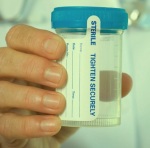 By: Jackie Bain
By: Jackie Bain
When a physician cannot bill for test results, and a company offers to give that physician those test results for free, a Florida Federal Court has ruled that the company is offering the physician prohibited remuneration. On May 5, 2014 the Middle District of Florida granted partial summary judgment on the latest motion in a contentious litigation between Ameritox Ltd. and Millennium Laboratories, Inc. Ameritox and Millennium are competitors and clinical laboratories that screen urine specimens for the presence of drugs.
Millennium provided free point of care testing cups to physicians, who use the cups for initial testing and then return the cups back to Millennium for confirmation tests. Physicians do not bill patients or insurance companies for the point of care tests.
Ameritox claimed that the provision of free point of care testing cups to physicians violates the Federal Anti-Kickback Statute and Stark law. Neither law allows a private citizen to make a claim against another private citizen for its violation (i.e., a government entity would have to assert a cause of action for violation of these laws against a private company). Ameritox argued, however, that Millennium’s alleged violations of the laws provided a basis for Ameritox’s unfair competition claims.
The Stark Law prohibits physicians from referring their Medicare and Medicaid patients to business entities with which they have financial relationships. The term financial relationship includes compensation arrangements involving remuneration between the physician and the entity. The Stark law does provide exceptions from the definition of remuneration. However, the Court determined that, in the event that a free device provides an additional benefit to a physician, the device is considered prohibited remuneration.
The Anti-Kickback Statute prohibits health care providers from knowingly and willingly offering to pay any remuneration to induce a physician to refer a patient for services covered by Medicare or Medicaid. It defines remuneration as including “transfers of items or services for free or for other than fair market value”.
The Court held that the provision of free point of care testing cups to physicians constitutes remuneration (under both the Stark Law and the Anti-Kickback Statute) when those physicians could not otherwise bill for testing of the same specimen. The Court reasoned that provision of free point of care testing cups provides a valuable benefit to physicians in the form of free preliminary test results that the physicians could not have otherwise obtained. The Court left open for the jury to decide the provision of free point of care testing cups to physicians constitutes remuneration when physicians could bill for the testing done with the cup and agreed not to.
As an academic aside, apart from this lawsuit and applicable Federal law, it is important to note that Florida law contains an anti-kickback statute that is specific to clinical laboratories. The law is broad and does not contain the safe harbor exceptions incorporated into the Patient Brokering Act. Clinical laboratories operating in Florida are well-served to become educated about this law.
